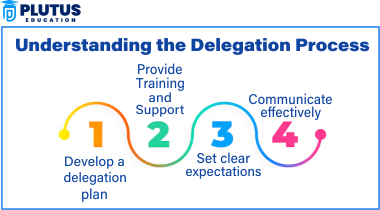Delegation in management means providing specific responsibilities, tasks, or authority to others and remaining liable for the outcome of these tasks. It is the core managerial skill that allows a manager to distribute workload and empower teammates by giving them responsibility and freedom. Proper delegation lets the manager focus on more strategic goals while boosting employee development toward larger tasks. Management delegation involves the assignment of work and the provision of authority to complete these assignments, thus forming the core of any organizational success. This implies that managers can have better operational flows and increased productivity, and it is one of the most vital leadership skills that one can ever learn.
What is Delegation in Management?
It has been defined that delegation in management is the practice of granting responsibility and authority to complete specific work to others. In a business environment, delegation refers to giving work or delegation of decision-making to subordinates by a manager or leader. The manager is responsible, but the delegate is responsible for completing the given task.
Delegation is crucial to allow the smooth flow of activities within an organisation as it helps disperse work into a team, reduces bottlenecks, and allows for specialisation. Good delegation enables managers to use their time more productively, avoid micro-managing and help employees be professionally independent.
In short, delegation is not about giving away control but about entrusting some duties to others and encouraging them to be successful at what they do. It is a skill that managers at all levels must master to lead efficiently and foster an environment of growth within the organization.

Elements of Delegation in Management
Delegation in management encompasses various key elements to ensure the process is effective and efficient. Responsibility, authority, and accountability are some of the elements. It will balance all three elements appropriately in a successful delegation process.
Responsibility
Managers are responsible for seeing that the one receiving the task should have the authority to make decisions and hold people accountable in return. Responsibility refers to what needs to be done in specific tasks or duties which fall under the individual’s responsibility. Delegating managers describe the scope of what is done and ensure that the delegate knows what he has to do.
Authority
Authority is the right given to the representative to create decisions and solutions and then enact those actions necessary to accomplish the task. Without the right authority, the employee delegated may be unable to get the job done.
Accountability
Accountability ensures that the person to whom the task has been delegated has to account for the result. For this purpose, accountability becomes essential because the task that has been delegated must be finished within the prescribed time frame in addition to the right quality.
Importance of Delegation In Management
Managers should communicate their specific expectations and give the delegate all the resources and support to enable success. Delegation in management is crucial since it saves managers from burnout, increases productivity, and gives a team-based work environment. If delegation is done right, it brings about the following benefits:
Advantages and Disadvantages of Delegation in Management
As with any other management strategy, delegation comes with advantages and disadvantages. These help managers decide when and how to delegate best.
Advantages of Delegation in Management
Through delegation, projects get completed much faster since different people handle various tasks. This cuts bottlenecks and accelerates workflows.
- More Efficiency: Delegating tasks to specific team members frees the manager to focus on other, more valuable work. This reduces workloads and increases overall efficiency.
- Employee Development: The delegation process helps the employee learn something new, increase responsibility, and develop personally and professionally. It contributes to both personal and professional development in an individual and an organization.
- Quality Decisions: A manager usually makes quality decisions by delegating the task to a person with special knowledge. Usually, delegates are better qualified to do the work assigned and, hence, develop higher-quality outputs.
- Free time management: Managers free their time by delegating tasks that are time-consuming or outside the scope of work; they can strategically work on leadership and other high-priority concerns.
- Build Talent: Newly skilled and experienced employees grow professionally and personally. It boosts their confidence and prepares them for future leading roles.
- Boosts Motivation: Appointing such employees for crucial work that shows people their value leads to increased job satisfaction and motivation. Motivated people are productive ones.
Disadvantages in Delegation In Management
Multiple barriers plague management, resulting in a practical inability to delegate and hence huddling in various instances. Such personal and organisational limitations form significant portions of barriers that they go through while practising the same art of delegating.
The team members from a manager who lacks trust in their team will find it difficult to delegate. A manager who thinks an employee cannot do the job will not delegate anything.
- Loss of control: The manager might fear losing control over the task. He or she might think delegating will lead to losing authority and position.
- Poor Communication: Instructions and expectations are not communicated well. Delegation goes wrong. Lack of communication can result in miscommunication, misunderstandings, and frustration.
- Lack of Training: Employees lack the skills or experience to accomplish the task delegated to them. Managers have a responsibility to ensure that employees are adequately trained before delegate.
- Overloaded Staff: The manager may not delegate more work if an employee is already burdened with much workload. Work should be delegated according to the capacity and capability of the employee.
Difference Between Delegation and Decentralization in Management
Delegation and decentralization are the distribution of authority but differ in scope and application. In delegation, a manager assigns specific tasks or responsibilities to subordinates, but the ultimate responsibility for the outcome still lies with the manager. Decentralization refers to the process of dispersing decision-making authority systematically in an organization. Decentralization is a broad process of granting authority to several levels of management or departments. Generally, decentralization applies to the authority on decision-making and not to any particular task.
| Aspect | Delegation | Decentralization |
| Definition | Assigning specific tasks or responsibilities to subordinates while retaining ultimate responsibility for the outcome. | The systematic distribution of decision-making authority across various levels of management or departments within an organization. |
| Scope | Narrower, typically involves individual tasks or projects. | Broader, involves authority across different levels or departments of the organization. |
| Control | The manager retains control over the final decision and the outcomes of the tasks delegated. | Decision-making power is spread across different management levels, leading to less centralized control. |
| Responsibility | Responsibility for the tasks remains with the manager, even though the tasks are delegated to others. | Responsibility is distributed throughout the organization, with different levels of management having autonomy. |
| Nature of Authority | Authority is assigned on a case-by-case basis, specific to the delegated task. | Authority is permanently distributed to various levels or departments, and it is ongoing. |
| Purpose | To reduce the manager’s workload and develop the skills of subordinates. | To increase flexibility, responsiveness, and decision-making at various organisational levels. |
| Decision-Making | Decision-making is usually still guided by the manager’s oversight and approval. | Decision-making power is transferred to lower levels, with little to no need for managerial oversight. |
| Example | A manager delegates the responsibility of handling client meetings to a team member. | A regional manager can make decisions for regional operations, without seeking approval from top management. |
Delegation In Management FAQs
Explain the importance of delegation?
Delegation is important because it enhances productivity, builds employee skills, and helps make better decisions.
Who is a delegate?
A delegate is an agent authorised to act in the place of another person. In the corporate world, a delegate refers to an employee to whom a manager assigns specific tasks.
What is delegation of authority defined as?
Delegation of authority refers to the transfer of decision-making authority from the manager to subordinates.
What are the types of delegation of authority?
There are different types of delegation: general, specific, formal, informal, top-down, bottom-up, and lateral.
What is delegation in management?
Delegation in management is assigning tasks to subordinates while retaining accountability.


